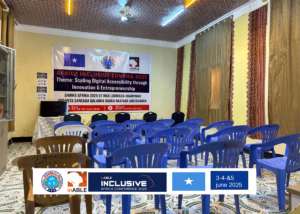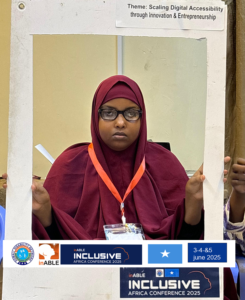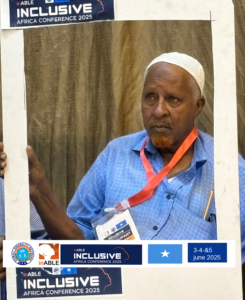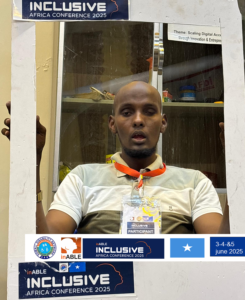Three days conference Inclusive Africa conference 2025 organized by InAble is held in Nairobi Kenya participated by several hundred people most of the disabled people come from around the world and mostly from the Africa continent. The third inclusive Africa conference 2025 theme was unique.
Inclusive Africa conference 2025 held from June 3–5 at the JW Marriott Hotel in Nairobi, Kenya, brought together global technology leaders, government agencies, innovators, and disability rights organizations to explore groundbreaking solutions that promote equitable digital access across Africa.
day one was watch part introduction and the watch member states speech and the opening word for the high delegates participated in the confrere. Where watch part were life in their countries nearly 20 nations including Somalia live watch part from Mogadishu hosted by SDN Somali Disability Network a consortium of more then 15 organization and several hundred individual members that made possible advocacy for the legislations and polices made in Somalia.
In Mogadishu day two presented AT tools that allows the PWDs control their room work and home application in the mobile phone the light, kitchen, washing machines, air conditioner, windows and door opening and closure management, access in one clip on your smart mobile hone. This tools is made Mr. Abdullahi Omar student Jamhuriya university. And Mr. Abdullahi Hassan present tricycle wheelchair made local cheaper, avoidable and avoidable for repair
The conference emphasized that accessibility is not a luxury or an afterthought but a fundamental human right and a critical foundation for full economic participation. A significant focus was placed on promoting youth-led thought leadership, advancing accessible education, entrepreneurship, and financial systems, and supporting policies and products designed with and for people with disabilities.
The conference featured participation from global tech leaders such as Google, Microsoft, Meta, Uber, and Intuit, alongside government agencies, innovators, policymakers, entrepreneurs, educators, organizations of persons with disabilities, and the Mastercard Foundation.
People with physical challenges (also called physical disabilities or mobility impairments) often rely on assistive technology (AT) to help them perform daily tasks, access education, engage in work, and move independently. Below is a summary of key assistive technologies for physically challenged individuals, especially in the African context:
Assistive technology (AT) for people with hearing impairments is essential for improving communication, education, social participation, and independence. Here’s a comprehensive overview of the key technologies, innovations, and African context. assistive and inclusive approaches for supporting deaf or hard of hearing people.
assistive Technology (AT) for Visually Impaired People including what it is, the tools available, and how it supports independence. And refeed the tools, devices, or software that help people who are blind or have low vision to live independently, access information, communicate, and navigate the world. Access to smartphone cameras to describe objects, people, text, and surroundings. Help visually impaired users navigate safely with smart white canes weWalk and applications like Lazarillo, Microsoft Soundscape access learning tools Braille printers/embosser, Audio books DAISY players, Bookshare and Tactile learning kits for math, science
Inclusive Africa Conference 2025 watch part Somalia
Three days conference Inclusive Africa conference 2025 organized by InAble is held in Nairobi Kenya participated by several hundred people most of the disabled people come from around the world and mostly from the Africa continent. The third inclusive Africa conference 2025 theme was unique.
Inclusive Africa conference 2025 held from June 3–5 at the JW Marriott Hotel in Nairobi, Kenya, brought together global technology leaders, government agencies, innovators, and disability rights organizations to explore groundbreaking solutions that promote equitable digital access across Africa.
day one was watch part introduction and the watch member states speech and the opening word for the high delegates participated in the confrere. Where watch part were life in their countries nearly 20 nations including Somalia live watch part from Mogadishu hosted by SDN Somali Disability Network a consortium of more then 15 organization and several hundred individual members that made possible advocacy for the legislations and polices made in Somalia.
In Mogadishu day two presented AT tools that allows the PWDs control their room work and home application in the mobile phone the light, kitchen, washing machines, air conditioner, windows and door opening and closure management, access in one clip on your smart mobile hone. This tools is made Mr. Abdullahi Omar student Jamhuriya university. And Mr. Abdullahi Hassan present tricycle wheelchair made local cheaper, avoidable and avoidable for repair
The conference emphasized that accessibility is not a luxury or an afterthought but a fundamental human right and a critical foundation for full economic participation. A significant focus was placed on promoting youth-led thought leadership, advancing accessible education, entrepreneurship, and financial systems, and supporting policies and products designed with and for people with disabilities.
The conference featured participation from global tech leaders such as Google, Microsoft, Meta, Uber, and Intuit, alongside government agencies, innovators, policymakers, entrepreneurs, educators, organizations of persons with disabilities, and the Mastercard Foundation.
People with physical challenges (also called physical disabilities or mobility impairments) often rely on assistive technology (AT) to help them perform daily tasks, access education, engage in work, and move independently. Below is a summary of key assistive technologies for physically challenged individuals, especially in the African context:
Assistive technology (AT) for people with hearing impairments is essential for improving communication, education, social participation, and independence. Here’s a comprehensive overview of the key technologies, innovations, and African context. assistive and inclusive approaches for supporting deaf or hard of hearing people.
assistive Technology (AT) for Visually Impaired People including what it is, the tools available, and how it supports independence. And refeed the tools, devices, or software that help people who are blind or have low vision to live independently, access information, communicate, and navigate the world. Access to smartphone cameras to describe objects, people, text, and surroundings. Help visually impaired users navigate safely with smart white canes weWalk and applications like Lazarillo, Microsoft Soundscape access learning tools Braille printers/embosser, Audio books DAISY players, Bookshare and Tactile learning kits for math, science






